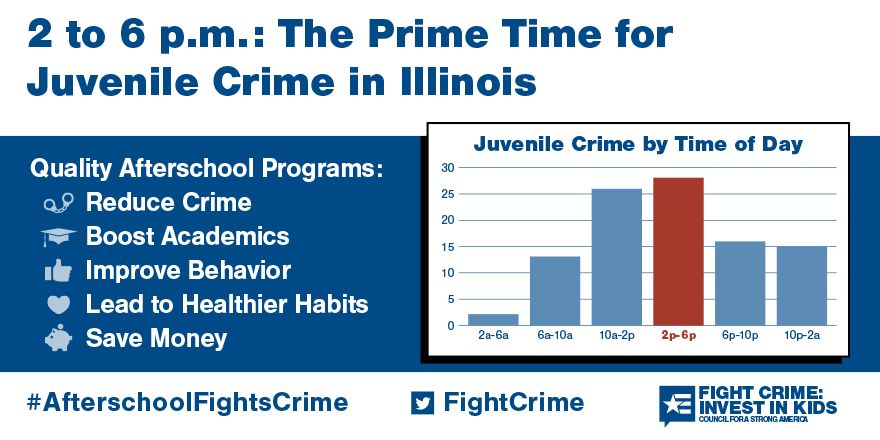After School: Still the Prime Time for Juvenile Crime in Illinois
Afterschool Fights Crime in Illinois
Related
The more than 5,000 law enforcement leaders around the nation who are members of Fight Crime: Invest in Kids, have long known that the hours immediately after school lets out, when parents are likely not available to supervise, are the prime time for juvenile crime. Over the past 20 years, law enforcement leaders across the country have relied on high-quality afterschool programs to provide supportive, stable, and enriching environments with caring adults that keep children and youth out of trouble and safe, while supporting their academic success, and social and emotional development.
The Prime Time for Juvenile Crime in Illinois

In Illinois, juvenile crime peaks between 2-6 p.m. on school days, with about 28 percent of all juvenile crime on those days occurring during the hours following the last school bell.
Program Highlight: BUILD, Chicago
BUILD first began in 1969 as a gang intervention program serving 200 youth in one Chicago, Illinois community. BUILD has since grown to serve more than 3,000 children and youth year-round in communities across Chicago. BUILD focuses on prevention (offering in-school and out-of-school activities that provide academic help, physical activities, mentoring and leadership development), intervention (working with youth who have already been involved in the juvenile justice system and providing an alternative to detention and/or providing supports to help them develop the social and emotional skills to make positive decisions in their life), and building futures (providing college and career preparation, youth leadership development, and physical and mental health supports).
Program evaluations found that 98 percent of BUILD students were promoted to the next grade, and 87 percent saw a decrease in risky behaviors, while 85 percent improved their conflict resolution skills.
The program specifically targets students who are getting into trouble at school, skipping school, and getting into trouble with the law, and works closely with schools, police departments, and judges. BUILD places a strong emphasis on “pro-social” activities for students, where students work on positive decision-making, setting goals for themselves, and learning the value of the community and relationships they can form within the community. Program evaluations found that 98 percent of BUILD students were promoted to the next grade, and more than 8 in 10 youth saw a decrease in risky behaviors (87 percent) and improved their conflict resolution skills (85 percent). 72 percent of youth in the restorative justice initiative avoided returning to detention.
Download the Graphic
Read the Press Release
See the Illinois Brief
Read More About
States
